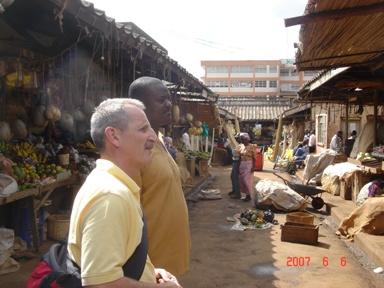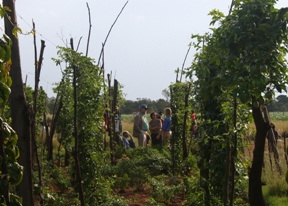Food and Income Security in the face of HIV/AIDS (FISH)
Purdue University
Purdue University has partnered with the Family Preservation Initiative of the Academic Model for Prevention and Treatment of HIV/AIDS (AMPATH) program to develop agricultural outreach services to HIV/AIDS-affected rural families in Kenya. The general objective of FISH is to improve the food and income security of AMPATH HIV/AIDS patients. This will be accomplished by developing a “toolkit” of proven agricultural techniques and enterprises for use by AMPATH patients.

Prof. Shawn Donkin, Purdue Animal Science, and Nauman Nybinda, head of AMPATH Family Preservation Initiative (FPI) extension, in a traditional market in Eldoret, Kenya. Being able to produce a product is only part of the challenge; finding a profitable market is often an even larger challenge.
- Herbs and spices – Examples of this category include chamomile, artemisia, and hot peppers. These crops adapt well to small-scale production. An acre of some of these crops would be a significant part of world demand. They are often dried, which reduces cost of processing and transport.
- Local vegetables – Many Kenyan vegetable producers have focused on production of non-African vegetables (e.g. collards, carrots, cabbages, onions). Many Kenyan consumers would like to buy indigenous vegetables like amaranth, nightshade, and cowpea.
- Fruits – FPI has some success in passion fruit. Are there other fruits that would be a profitable way to make use of the mild climate and abundant labor of Western Kenya in serving local, national, and international markets?
- Grain Legumes – Beans are the primary source of protein for most low-income Kenyans and the domestic demand is strong. Soybeans, peas, lentils, pigeon peas, chickpeas, fava beans, and other grain legumes might be profitable crops, while at the same time enriching the soil.
- Cereals – Maize is the staple food of most Kenyans and the main crop of most farmers. Improved maize production systems could reduce the land required to produce an adequate supply, opening land for other crops. Alternative cereals include sorghum and finger millet.
- Aquaculture – For some farmers with an adequate water supply fish farming might be an option.
- Poultry – Chickens for eggs and/or meat can be a low-labor, relatively low-investment enterprise that may fit some HIV/AIDS-affected farmers.
- Dairy –Smallholder dairy systems have been successfully used in other parts of Kenya (e.g. zero grazing dairy). Eldoret used to be the dairy center of Kenya. The decline of Eldoret area dairies has been linked to marketing problems. Can those marketing problems be resolved?
- Goats – The small size of many Western Kenya farms makes keeping cattle difficult. Many farms are less than one half acre. Goats for milk or meat may be an alternative.
- Honey – Bee hives require little space and only a small investment.

The Purdue team and FPI staff in a passion fruit field near Eldoret. Passion fruit is one of the AMPATH/FPI success stories; it is a high value product that can be produced in the Eldoret area and has a good market.
Sustaining Toolkit – This will be an on-going activity to fine tune the immediate response toolkit through in-depth market assessment, including international opportunities, research to test alternative production systems, and feedback from initial FPI experience with the enterprises. The fine tuning would continue with a three-step process: 1) market assessment, 2) production systems development and 3) testing with clients.
Purdue Horticulturalist Dr. Pamela Obura will be stationed in Eldoret, Kenya, to assist the AMPATH Family Preservation Initiative (FPI) beginning March 2009. She will focus on developing the toolkit and coordinating the research needed to resolve agricultural production and marketing constraints. She will be backstopped by Drs Steve Weller, Purdue Horticulture, and Dr. Maria Marshall, Purdue Agricultural Economics.For additional information please contact:

- Jess Lowenberg-DeBoer, Professor of Agricultural Economics
- Associate Dean and Director, International Programs in Agriculture
- Purdue University
- West Lafayette, IN 47907
- Phone: (765) 494-6876
- E-mail: lowenbej@purdue.edu
- www.agriculture.purdue.edu/ipia